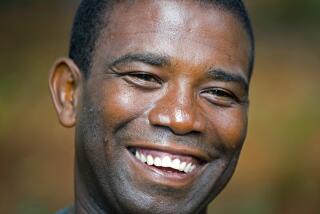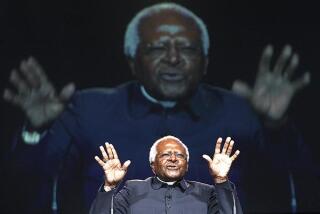Crowds Laud Return of Zaire Despot
- Share via
KINSHASA, Zaire — His step was slow, his body appeared frail and his voice often faltered. But Mobutu Sese Seko, Africa’s longest-serving ruler and some say one of its most venal tyrants, clearly basked in the glow of a triumphant return home Tuesday after four months in Europe for cancer treatment.
His country, as well as the world, was paying notice.
At the airport, he raised his silver-topped cane above his leopard-skin hat and slowly twirled in a circle above a red-carpeted podium to acknowledge the blaring brass band, marching honor guards, grinning officials, thousands of supporters and scores of reporters who had flocked to see him.
Huge crowds, many wearing shirts and dresses emblazoned with his portrait, cheered, waved flags and sang as his stretch Cadillac limousine, accompanied by trucks carrying heavily armed commandos and mounted antiaircraft guns, bounced along potholed roads for 20 miles from the airport to his palace inside a military base overlooking a bend in the Congo River.
Once there, the strongman who, his opponents say, has beggared and brutalized Zaire for 31 years pledged that he was again ready to solve the country’s myriad problems.
“The enemies of our country have chosen when I was sick to put a sword in my back,” Mobutu, 66, said in a nationally broadcast speech interrupted by applause, singing and the loud cawing of nearby peacocks. “I’m not going to disappoint you. I know your expectations and your hopes. I will act rapidly and positively.”
Mobutu, who said he had returned against his doctors’ advice, didn’t explain what he would do to repel the rebels who have emptied giant camps of Rwandan refugees and seized hundreds of square miles of territory in eastern Zaire since launching a surprise military offensive in October.
Backed by Rwanda and led by Mobutu’s longtime nemesis, Laurent Kabila, the Tutsi-dominated regulars now control about 6 million people, or almost 15% of Zaire’s population.
But fighting has ebbed, and the revolt appears to have stalled far short of Kabila’s announced goal of sweeping the country and toppling Mobutu’s regime.
Diplomats and analysts here expect Mobutu to reshuffle the Cabinet and change commanders of his corrupt, incompetent army, which has mostly fled without fighting and launched a brutal spree of pillage and terror against civilians.
Few expect the crippled giant that Zaire has become to easily recapture its lost towns and territory--a small but strategic part of this fractious creation of colonialism that includes more than 200 ethnic groups across a region the size of Western Europe.
But the war has meant a stunning comeback for Mobutu. Shunned in recent years by the United States and most other nations for what analysts have called his plundering of Zaire, and blamed at home for the country’s near collapse, he has suddenly moved from being disgraced and discredited to center stage of an international crisis.
Former Lt. Gen. Joseph Desire Mobutu, the son of a cook, was first acclaimed a savior when he seized control of Zaire in a CIA-backed military coup in 1965, five years after its independence from Belgium. He ended a series of secessionist movements and armed revolts that threatened to split the young nation.
But Mobutu soon created a personality cult that mixed ruthless repression, unbridled corruption and a titanic ego.
Deified in state propaganda, he was called the Messiah, Liberator and Guide. He assumed the name Mobutu Sese Seko Kuku Ngbendu wa za Banga, which translates as “the all-powerful warrior who, because of his endurance and inflexible will to win, goes from conquest to conquest leaving fire in his wake.”
Under a nationalist program he called “Mobutu-ism,” he ordered the nation to shed any European taint. Western suits and Christian names were outlawed. He seized about 1,500 foreign-owned businesses for his cronies. By 1976, when the government reversed measures allowing the confiscations, the economy was in shambles.
But the wily dictator survived by playing off his political rivals. Using divide-and-rule tactics, he co-opted opponents by letting them share in graft and allowed thuggish security forces to operate without accountability, analysts say. To forestall a coup, he divided the military into competing corps.
Overseas, he sold himself to Washington as an anti-Communist ally, allowing Zaire to be used as a lucrative channel for covert U.S. support of rebel forces in Angola. France, Belgium and other nations sent troops to protect Mobutu while using the country for military operations to prop up other former colonies and sympathetic regimes in the region.
As the country slid into penury, Mobutu siphoned money from state coffers, treating the national bank as a private reserve. Diplomats say Mobutu bought an estate on the French Riviera, chateaus in Spain and Belgium, a townhouse in Paris and a ranch in Portugal.
He urged his followers not to follow his lead. “You who have stolen money and put it into homes in Zaire and not abroad, I congratulate you,” Mobutu once told a rally.
His excesses, as well as the end of the Cold War, eventually made him an international pariah. He reluctantly ended one-party rule in 1990 to allow democratic reforms but worked behind the scenes to derail the transition.
After seven years of postponements, the country’s first elections are now scheduled to take place by July.
Meantime, Zaire’s economy has collapsed. The government barely functions, with no money spent on schools, hospitals or other basic services.
At least some of those who watched Mobutu’s return Tuesday stood sullenly amid the cheers.
“There is suffering and misery,” complained Yves Pagnol, 20, a student who went to the airport but insisted he was not there to welcome Mobutu. He pointed to the crowds behind him. “Among them are people who are very, very hungry,” he said bitterly.
More to Read
Sign up for Essential California
The most important California stories and recommendations in your inbox every morning.
You may occasionally receive promotional content from the Los Angeles Times.











